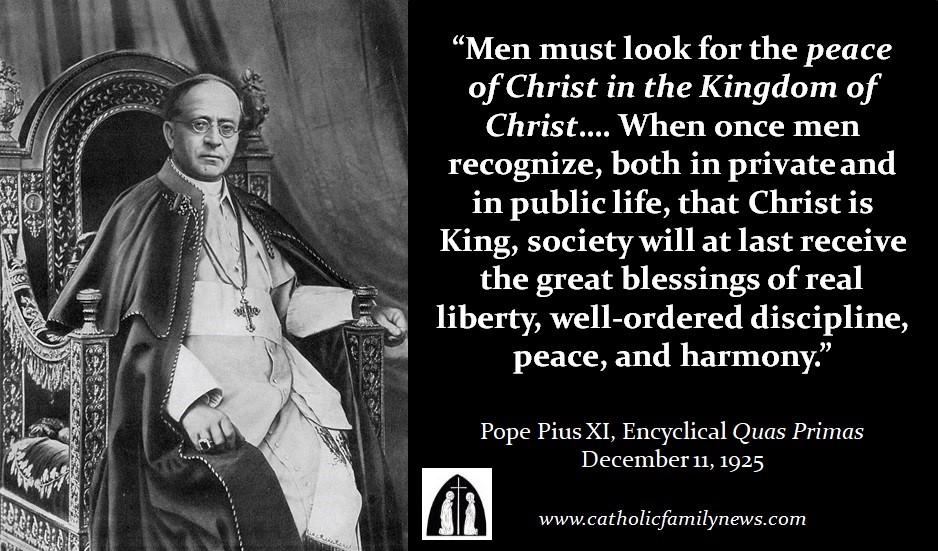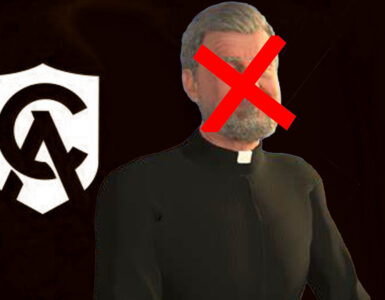On the eve of Holy Week this year, a controversy involving conservative commentator Candace Owens and The Daily Wire, which had been simmering for a few months prior, finally boiled over. Jeremy Boreing, co-founder and “lowercase god-king”[1] of the media company, announced via X (Twitter) on March 22 (Friday of Passion Week): “Daily Wire and Candace Owens have ended their relationship.” Less than an hour later, Owens confirmed the news by posting, “The rumors are true — I am finally free.”
As someone who rarely watches Daily Wire content, including Owens’ show, the news that the two parties “ended their relationship” was not in itself of great interest to me. My interest in this story stems from the fact that, following the announcement, Owens’ use of the phrase “Christ is King” was deemed “antisemitic” by some of her former colleagues and others, as if proclaiming the Kingship of Christ somehow implies a hatred of Jews. Nothing could be further from the truth, of course, but even certain Christian (and yes, Catholic) influencers have pushed this narrative — essentially trying to shame the faithful into not using a so-called “controversial phrase” — and have attempted to downplay the social dimension of Christ’s Kingship in the world here and now.
This should be a matter of great concern for all Christians, and especially for Catholics, given that Catholic social teaching is firmly rooted in the Social Kingship of Christ and is ultimately directed towards the extension of His reign in society.[2] Traditional Catholics, in particular, should be concerned about the unjust treatment of Candace Owens since they, like her, are smeared as “antisemites” by such groups as the Southern Poverty Law Center, which has libelously labeled Catholic Family News as a “hate group” for years.
As such, it is worth our time to consider what has transpired and to refute certain pernicious errors that have resurfaced in connection with this story.
Background to the Controversy
The controversy began as a disagreement between Candace Owens, a Protestant Christian, and Ben Shapiro, an Orthodox Jew, who co-founded The Daily Wire with Jeremy Boreing in 2015. Following the attack on Israel last October by Hamas (an Islamic jihadist group that controls parts the Gaza Strip), Shapiro, known for his staunch support of the Jewish state, took issue with Owens’ perspective that supporters on both sides of the conflict espouse false and wicked beliefs in order to justify total war against their enemies (see here, for example).
After an Israeli counter-offensive airstrike destroyed a Gaza City church in which Palestinian Christians were sheltering, for example, Owens posted: “I have been disgusted by the propagandists pretending a Christian church was not bombed. Christians were killed. No Christian should remain silent.” When someone implied that “antisemitism” is what inspired her comments, she replied, “Respectfully, if you think it’s antisemitism to notice that innocent Christians were killed in an IDF bombing then you need to log off of the internet and have your brain examined.”
Two weeks later, following a statement by U.S. Rep. Brian Mast of Florida that “there are very few innocent Palestinian civilians,” Owens posted: “No government anywhere has a right to commit a genocide, ever. There is no justification for a genocide. I can’t believe this even needs to be said or is even considered the least bit controversial to state.” (Months later, she clarified during an interview that she was responding specifically to Rep. Mast’s comments.)
For his part, Shapiro called Owens “absolutely disgraceful” and disparaged her “faux sophistication” on Israeli issues during an informal question-and-answer session, a recording of which was then posted on social media. Without mentioning Shapiro or his insults, Owens posted a portion of Our Lord’s Sermon on the Mount (“Blessed are the peacemakers…”), including, “You cannot serve both God and money,” followed by “Christ is King.”
Shapiro assumed that all of this was directed at him, so he responded, “Candace, if you feel that taking money from The Daily Wire somehow comes between you and God, by all means quit.”
This clearly incensed Owens, as she replied: “You are utterly out of line for suggesting that I cannot quote biblical scripture. The Bible is not about you,” and again, “Christ is King.”
She went on to reproach Shapiro for “acting unprofessional and emotionally unhinged for weeks now,” referring to his coverage of the hostilities in Israel. “And we have all had to sit back and allow it and have all tried to exercise exceeding understanding for your raw emotion.”
“But,” she went on, “you cross a certain line when you come for scripture and read yourself into it. I will not tolerate it.”
Interestingly, Daily Wire CEO Boreing said at the time: “Candace is paid to give her opinion, not mine or Ben’s. Unless those opinions run afoul of the law or she violates the terms of her contract in some way, her job is secure and she is welcome at Daily Wire.” Something clearly changed, however, given Owens’ sudden and unceremonious departure.

Accusations of “Antisemitism” and Theological Errors
On the same day that Boreing announced Owens’ departure, Andrew Klavan (another DW host) spent roughly half of his hour-long show addressing the controversy, accusing Owens of being “antisemitic” (citing examples which, after reviewing them in their full context, I don’t find compelling),[2] and ultimately defending the position that Owens had to go. He chose to call that episode, “Because Christ Really Is King,” and concluded his segment on the controversy by stating that Owens “has to leave for one reason above every other — there are lots of reasons — but the one reason above every other is because Christ is King. We cannot let Him be defamed, even if they call Him, ‘the Jews’ [earlier in the segment, Klavan said that ‘Jew hatred is Christ hatred in disguise’]. We cannot let Christ be defamed at this place, because Christ is King.”
Klavan, who is Jewish, recounted how it was almost 20 years since he “acknowledged the Kingship of Christ in [his] life” and was baptized (in the Episcopal Church). He recalled how the “priest”[4] who baptized him said at the time, “You know, Christians won’t accept you. You’ll still be a Jew.” Klavan, however, said that such has not been the case for him — for the most part, at least. “Christians have welcomed me with open arms,” he said, “except this ‘Christ the King’ antisemitic crowd.”
He then proceeded to spout some serious errors:
“Christ is the King, and one day every knee will bow…. But when you use that phrase to mean that God has abandoned His chosen people, the Jews, through whom He came into this world incarnate, and that He’s broken His promises — His covenant with the Jews — you are quoting Scripture like Satan does in the Bible. You are quoting Scripture to your purposes, and that, to me, is specifically wicked.”
First off, the phrase “Christ is King” does not appear in Scripture (the closest approximation would be “Jesus of Nazareth, King of the Jews” in John 19:19), so Klavan’s accusation of “quoting Scripture like Satan does” is nonsensical. Secondly, he essentially claims to know the mind of Candace Owens and her motives when she posted “Christ is King,” information to which he obviously does not have access. Lastly, and most importantly, Scripture clearly teaches that the Old (Mosaic) Covenant has indeed been fulfilled and superseded by the New Covenant — the one promised by God in the Old Testament (cf. Jer. 31:31) and sealed in the New Testament by the Precious Blood of His Son (cf. Matt. 26:28; Mark 14:24; Luke 22:20; 1 Cor. 11:25).
St. Paul, a former Pharisee, wrote in his Epistle to the Hebrews (after quoting from the Prophet Jeremias regarding God’s promise): “Now in saying a new, He hath made the former old [from the Greek root palaióō, meaning obsolete]. And that which decayeth and groweth old is near its end” (Heb. 8:13). And in his Epistle to the Galatians, which he wrote primarily to refute the errors of Judaizers (the first heretics to trouble the Church), St. Paul affirmed that “they who are of faith [i.e., faith in Christ], the same are the children of Abraham” (Gal. 3:7). He thus emphasized that “in Christ Jesus neither circumcision availeth anything, nor uncircumcision: but a new creature. And whosoever shall follow this rule, peace on them and mercy: and upon the Israel of God,” an obvious reference to the Church (Gal. 6:15-16), the new temple in which Jews and Gentiles have equal access to God through Christ (cf. Eph. 2:11-22).
Returning to Klavan’s monologue, he shockingly went on to say that it would be detrimental for Ben Shapiro to convert to Christ:
“I look at Ben’s life and I think, ‘If Ben were to embrace Jesus Christ, it would cause devastation — to his family, to the people who love him, to the people who listen to him, to his position in the world.’ I just have this feeling that God has put this guy where He wants him, to do what He wants him to do. And as you know, I feel that, you know, that the Jews were not abandoned by God.”
These comments are both shameful and heretical. Thankfully, Bishop Athanasius Schneider succinctly refutes them in his book Credo: Compendium of the Catholic Faith, which was published last year by Sophia Institute Press:
“Is Judaism a source of sanctifying grace and salvation for its adherents? No. Even before the time of Christ, no one was saved by works of the Old Law, but only by faith in the coming Redeemer. This Law, with its precepts and ceremonies, was fulfilled and surpassed by the New Covenant in Jesus Christ (see Rom. 3:28; and Gal. 2:16).
What of John 4:22, where Our Lord says: ‘Salvation is from the Jews’? Jesus Christ is Himself the fulfillment of this prophecy, whereas contemporary Judaism, also called Talmudic or Rabbinic Judaism — without temple, priesthood, or sacrifice — is not the same religion that God established in the Old Testament. Rejecting the true Messiah, the Old Law has thus become ‘both dead and deadly’ [Summa Theologiae I-II, q. 103, a. 4].
What of Romans 11:29: ‘The gifts and the calling of God are irrevocable’? St. Paul speaks here of God’s abiding love for the Jews, foretelling their conversion to Christ before the end of time. Until then, contemporary Judaism as a whole exists as a rejection of God’s calling, since there can be no fidelity to the Old Covenant where its fulfillment in the New is denied: ‘If you believed Moses, you would believe Me, for he wrote of Me’ (John 5:46). The call of God is to believe in His Son, and those who believe are sons of Abraham, heirs of the promise (see Gal. 3:29).”[5]

Bishop Schneider is simply reiterating perennial Catholic doctrine, as Pope Pius XII taught, for example, in his Encyclical Mystici Corporis Christi (1943):
“… by the death of our Redeemer, the New Testament took the place of the Old Law which had been abolished; then the Law of Christ together with its mysteries, enactments, institutions, and sacred rites was ratified for the whole world in the Blood of Jesus Christ. … ‘To such an extent, then,’ says St. Leo the Great, speaking of the Cross of our Lord, ‘was there effected a transfer from the Law to the Gospel, from the synagogue to the Church, from the many sacrifices to one Victim, that, as Our Lord expired, that mystical veil which shut off the innermost part of the temple and its sacred secret was rent violently from top to bottom [Sermon LXVIII].’” (n. 29)
Three days after announcing Owens’ departure, Boreing likewise claimed that the phrase “‘Christ is King’ may be antisemitic in connotation while not in denotation when it is being used to express antisemitism.” He warned Christians not to use Our Lord’s Name “to troll Jews,” or “as a cudgel to bash those in whom the Light of God yet flickers.”
“If you do,” he said, “you are a blasphemer and an antisemite and a piece of crap generally, and the fear of the Lord is clearly not in you.” (This, coming from a man who goes by the brazenly impious nickname “god-king”!)
What Boreing fails to grasp is that those Jews who reject Christ do not have “the Light of God” in them precisely because they reject Christ, Who is “the Light of the world” (John 8:12, 9:5). This Scriptural truth is expressed eloquently in the traditional Good Friday prayer for the Jews, which Boreing would no doubt vilify as “antisemitic”:
“Let us pray also for the Jews: that our God and Lord would remove the veil from their hearts: that they also may acknowledge our Lord Jesus Christ.
Almighty and everlasting God, Who drivest not away from Thy mercy even the Jews: hear our prayers which we offer for the blindness of that people: that acknowledging the light of Thy truth, which is Christ, they may be rescued from their darkness.”[6]
Christ is King, Here and Now
Various influencers voiced their opinions in the aftermath of the “Christ is King” controversy, among whom were Jenna Ellis (Protestant) and Lila Rose (Catholic).
Ellis, an attorney who served on President Donald Trump’s 2020 re-election campaign, took to X (Twitter) on Palm Sunday (March 24) and asserted that “the debate over the term ‘Christ is King’ IS NOT over the question of whether Christians believe Jesus is Lord and fully God, and proclaim that. … The debate IS over supercessionism or ‘replacement theology;’ the idea that the New Testament Christian Church has superseded and replaced the nation of Israel as God’s chosen people.”
“Some prominent voices who use the term ‘Christ is King’ IN THIS CONTEXT,” she said, “do so as an antisemitic dogwhistle against Jews, indicating that God has abandoned them for Christians.” And ultimately, she expressed her belief that “replacement theology is false and heretical as a doctrine.”
Based on this post, it seems that Ellis subscribes to dispensationalism, a 19th-century heresy developed and spread by John Nelson Darby (1800-1882), an English lawyer turned Anglican clergyman who then broke away to help form the Plymouth Brethren sect. Space does not permit a detailed look at Darby’s heretical system, but suffice it to say, as Catholic author Carl Olson explains, that “the radical dichotomy between Old Testament Israel and the Church is the heart and soul of dispensationalism.”[7] In short, dispensationalists hold that the Jews are still God’s chosen people, despite their rejection of Christ, and that the Kingdom announced by Him “is a future, earthly reality meant for the Jews,”[8] rather than a present reality in His Mystical Body the Church.
This is of course contrary to what the true Church of Christ has always believed and taught, namely, that the Church herself is the Kingdom of God on earth. The Roman Catechism, issued by decree of Pope St. Pius V (1566), makes this clear in its teaching on the second petition of the Lord’s Prayer, “Thy kingdom come” (Matt. 6:10): “In this Petition we ask God that the kingdom of Christ, that is, His Church, may be enlarged; that Jews and infidels may embrace the faith of Christ and the knowledge of the true God; that schismatics and heretics may return to soundness of mind, and to the communion of the Church of God which they have deserted….”[9]

Fr. E. Sylvester Berry (1879-1954), a professor of apologetics, further explains: “The Church, as an external society carrying on the ministry of Christ, constitutes the Kingdom in its exterior social aspect. In the work of sanctifying souls the Church produces the Kingdom in its interior and spiritual aspect. By accomplishing the work of salvation on earth the Church prepares for the kingdom in its eschatological aspect; it is preparing to become the Church triumphant in heaven.”[10]
Sadly, even some Catholics want to limit Christ’s Kingdom to its spiritual and eschatological aspects and downplay its “exterior social aspect.” This brings us to Lila Rose, a famous pro-life activist, who said the following during her March 25 podcast:
“So, I think when we say ‘Christ is King,’ we have to understand both the historical context and the spiritual context of the phrase and what it really means, because it does not mean political power in this world. It does not mean that. It means [the] eternal, sovereign reign of our God…. He is the King of the universe, but He chose, while on earth, to die and be treated as the least of these for the sake of our salvation.”
She also quoted Our Lord’s words to Pontius Pilate, “My kingdom is not of this world” (John 18:36), and said she thinks “we need to be cautious maybe about the zeal, the zealousness with which we want to proclaim Christ’s Kingship, and make sure that zealousness is towards His eternal sovereignty and not towards us wanting more political power and media power in this life.” Furthermore, she interpreted Our Lord’s words to mean that “He’s saying to us as Christians, ‘Your job is not to build systems of power in media and politics and all of these things. Yes, you may be called to do work in media and politics, to reform it, to bring salt and light, but My kingdom is not of this world. My kingdom is a world of — is eternity. I am the sovereign Lord in eternity.’”
If Rose were familiar with Pope Pius XI’s Encyclical Quas Primas (1925), she would know that while Our Lord’s “kingdom is spiritual and is concerned with spiritual things,” it is nevertheless “a grave error … to say that Christ has no authority whatever in civil affairs, since, by virtue of the absolute empire over all creatures committed to Him by the Father, all things are in His power,” and further, that “all men, whether collectively or individually, are under the dominion of Christ. In Him is the salvation of the individual, in Him is the salvation of society” (nn. 15, 17, 18). While Our Lord’s Kingdom is not of this world, it is certainly meant to have an impact in this world, and it is the duty of all Catholics — members of His Kingdom on earth (see n. 12) — to see that this happens.

“When once men recognize, both in private and in public life, that Christ is King,” wrote Pius XI, “society will at last receive the great blessings of real liberty, well-ordered discipline, peace, and harmony. … If princes and magistrates duly elected are filled with the persuasion that they rule, not by their own right, but by the mandate and in the place of the Divine King, they will exercise their authority piously and wisely, and they will make laws and administer them, having in view the common good and also the human dignity of their subjects. The result will be a stable peace and tranquility, for there will be no longer any cause of discontent. Men will see in their king or in their rulers men like themselves, perhaps unworthy or open to criticism, but they will not on that account refuse obedience if they see reflected in them the authority of Christ, God and Man” (n. 19).
The Kingship of Christ must not be reduced to a pious devotion focused solely or even primarily on eternity. His reign, which He exercises through His ministers in Church and State, must have a tangible impact in the world here and now. “Thy kingdom come. Thy will be done on earth as it is in heaven” (Matt. 6:10).
Conclusion: We Must Restore His Crown
In her first public response to detractors following the announcement of her departure from The Daily Wire, Candace Owens drove home a crucial point:
“The reason why some people believe that with enough insistence they can convince American Christians that the basic truth, ‘Christ is King,’ is actually antisemitic is because they have been successfully spiking the ball on Christianity for the past 60 years.
Inch by inch, by pretending to be our friends and making us fearful of having the media project us as overzealous is how they have scored so many wins.” (Emphasis added)
How interesting that she identified “the past 60 years” as especially devastating for Christianity. What was taking place 60 years ago in Rome? The Second Vatican Council (1962-1965), which threw open the windows of the Church and thus allowed entrance to the spirit of the world and “the cult of man,”[11] including the errors of Liberalism. Archbishop Marcel Lefebvre (1905-1991) wrote an important book on this subject entitled, They Have Uncrowned Him, in which he observes:
“For a century and a half of struggle without truce, the Popes [Gregory XVI through Pius XII] have condemned the principles and the points of application of Liberalism. In spite of that, the sect has pursued its path. We have been present at is penetration into the Church, under pretense of an acceptance of Liberalism, with the idea of reconciling Jesus Christ with the Revolution. Then we learned, with amazement, of the plot of penetration of the Catholic hierarchy by the liberal sect [a reference to the Permanent Instruction of the Alta Vendita, which he covers]; we have seen its progress, right up to the highest posts, and its triumph at the Second Vatican Council. We have had liberal Popes.”[12]
What must be done in the fact of this diabolical plot? Archbishop Lefebvre answers:
“We have to fight more than ever for the social Reign of Our Lord Jesus Christ. … We have to build, while the others are demolishing. The crumbled citadels have to be rebuilt, the bastions of the faith to be reconstructed: firstly the Holy Sacrifice of the Mass of all times, which forms saints; then our chapels, which are our true parishes; our monasteries; our large families; our enterprises faithful to the social doctrine of the Church; our politicians determined to make the politics of Jesus Christ — this is a whole tissue of Christian social life, Christian customs, Christian reflexes, which we have to restore, on the scale that God wants, at the time God wills. All that I know, the faith teaches us; it is that Our Lord Jesus Christ must reign here below, now, and not only at the end of the world, as the Liberals would have it!”[13] (Emphasis added)
Candace Owens is right: Christ is King. Let us pray that she will soon join her Catholic husband in the one true Church and promote what Pius XI proclaimed in Quas Primas: “Men must look for the peace of Christ in the Kingdom of Christ” (n. 1).
*****
Postscript: Last Friday, Candace Owens said she “would like to debate Ben Shapiro on Israel and the *current* definition of antisemitism.”
Shapiro responded and proposed a live debate on his show on Monday (for obvious reasons, Owens objected to The Daily Wire hosting the debate).
After a back-and-forth with Shapiro and Boreing, throughout which Owens noted she was out of the country and thus not immediately available, she ultimately accepted the terms of having an unmoderated debate with Shapiro on the aforementioned topic.
If and when the debate actually happens, the phrase “Christ is King” should certainly be addressed, especially in light of Shapiro’s disingenuous claim that he thinks “it’s a good thing for Christians to say.”
UPDATED (4/22/2024): Today, Candace Owens announced her “decision to go home,” that is, to enter the Catholic Church, a decision she plans to discuss in more detail in the future. Deo gratias for this wonderful news!
[1] According to his X (Twitter) profile.
[2] For a good primer on this subject, see Fr. Dominique Bourmaud, An Introduction to Catholic Social Doctrine (Kansas City: Angelus Press, 2019). See also Dr. Peter Kwasniewski’s seven-part series, “May His Kingdom Come: Catholic Social Teaching,” which is available on the Catholic Family News website (here).
[3] Owens has responded to one of Klavan’s examples here.
[4] Episcopalians, like Anglicans, do not have valid Holy Orders. See Pope Leo XIII, Apostolic Letter Apostolicae Curae on the Nullity of Anglican Orders (Sept. 13, 1896).
[5] Bishop Athanasius Schneider, Credo: Compendium of the Catholic Faith (Manchester: Sophia Institute Press, 2023), p. 34.
[6] The Daily Missal and Liturgical Manual, 1962 (London: Baronius Press, 2007), p. 582.
[7] Carl E. Olson, Will Catholics Be “Left Behind”? A Catholic Critique of the Rapture and Today’s Prophecy Preachers (San Francisco: Ignatius Press, 2003), p. 139. Olson provides a detailed explanation and critique of dispensationalism in his book.
[8] Ibid., p. 138.
[9] Roman Catechism, Part IV: The Lord’s Prayer (Charlotte: TAN Books, 2017), p. 565.
[10] Fr. E. Sylvester Berry, STD, The Church of Christ: An Apologetic and Dogmatic Treatise (Eugene: Wipf and Stock Publishers, 2009), p. 28.
[11] In his closing address at the Council (Dec. 7, 1965), Pope Paul VI called upon “those who term themselves modern humanists, and who have renounced the transcendent value of the highest realities, to give the Council credit at least for one quality and to recognize our own new type of humanism: we, too, in fact, we more than any others, honor mankind [Italian, siamo i cultori dell’uomo, which can be translated as ‘have the cult of man’].”
[12] Archbishop Marcel Lefebvre, They Have Uncrowned Him: From Liberalism to Apostasy (Kansas City: Angelus Press, 1988), pp. 249-250.
[13] Ibid., p. 251.




